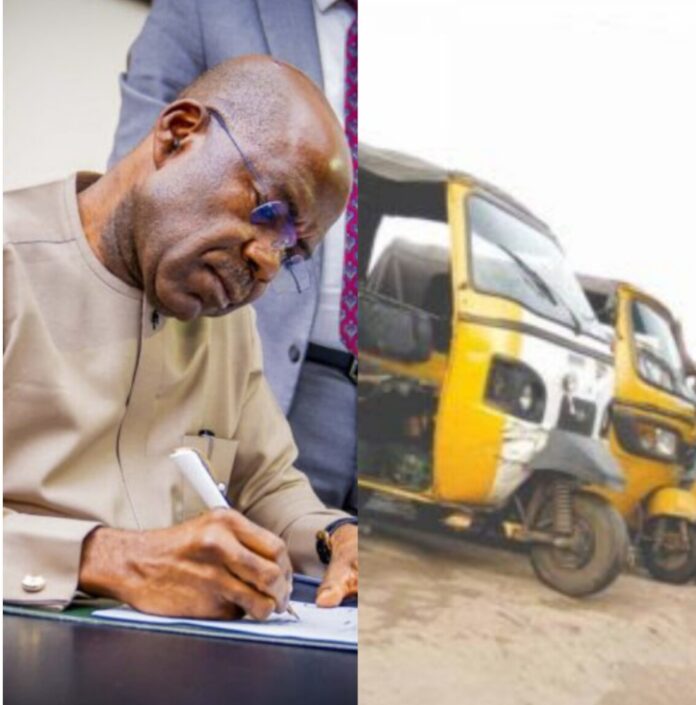Aba, Nigeria – June 27, 2024
The Foundation for Environmental Rights, Advocacy and Development (FENRAD), a renowned pro-democracy and environmental rights advocacy group in Abia State, has voiced significant concerns over the recent policy issued by the Abia State Government, limiting the operating hours of tricycle and motorcycle operators. This move, announced on June 25 and signed by Hon. Prince Uzor Nwachukwu, the Commissioner for Local Government and Chieftaincy Affairs, has drawn criticism from various quarters, with FENRAD leading the charge.
In their statement, FENRAD recalled a similar restriction imposed back in 2006 aimed at curbing street crimes. This policy, however, was lifted during election periods by successive governments, seemingly as a strategy to garner political support from tricycle and motorcycle operators. The organization’s executive director, Comrade Nelson Nnanna Nwafor, expressed bewilderment that the current administration under Governor Alex Otti is resorting to a tactic deemed outdated and ineffective nearly two decades ago.
Economic and Social Impact
FENRAD highlights the adverse socio-economic impacts of such a restriction, particularly in the context of the recent removal of petrol subsidies. This policy shift has forced many Abians to switch from private cars to tricycles and motorcycles as more affordable means of transportation. The exponential increase in the number of tricycle and motorcycle users over the past year underscores the critical role these vehicles play in the state’s transportation network. Many residents rely on them to access areas otherwise unreachable by cars, and for those whose businesses or workplaces close late, these restrictions could pose significant hardships.
The foundation argues that without providing alternative transportation solutions or palliatives, the government’s policy could isolate numerous citizens and exacerbate existing economic struggles. They point out that many evening operators are government employees using tricycles as a means to supplement their incomes in the face of declining purchasing power and stagnant wages.
Nightlife and Economic Growth
FENRAD further contends that the restriction is counterproductive to the government’s broader economic goals. Governor Otti’s administration has made commendable strides in reviving nightlife in Aba and Umuahia through the installation of streetlights and improvements in road infrastructure. These efforts have attracted socialites, showbiz personalities, and hospitality investors, contributing to the local economy. However, restricting tricycle and motorcycle operations could deter this growth, reducing nighttime activity and undermining these achievements.
Security Concerns and Recommendations
Acknowledging the rise in street crimes involving tricycles, FENRAD suggests that banning their operations is not a sustainable solution. They urge the state government to adopt more strategic and innovative security measures, such as mapping crime hotspots and deploying enhanced surveillance technologies, including CCTV and street cameras. The foundation also recommends increased collaboration with tricycle and motorcycle unions to ensure proper vehicle registration and identification, which would aid in crime prevention and investigation.
FENRAD cites the successful security intervention at the Lokpanta axis, where targeted actions under Operation Crush significantly improved safety without imposing a vehicle ban. They advocate for similar strategic interventions across the state to address issues like cultism and mugging more effectively.
Call to Action
In conclusion, FENRAD calls on the Abia State Government to reconsider the restrictive policy and engage with a broader range of stakeholders to develop a more comprehensive approach. They emphasize the importance of continuing infrastructure projects, enhancing employment opportunities, and raising the overall security standards as more effective means of tackling the state’s challenges.
Comrade Nelson Nnanna Nwafor, on behalf of FENRAD, reiterates the organization’s commitment to advocating for policies that balance security concerns with the socio-economic wellbeing of Abia’s citizens. He urges the government to focus on holistic and sustainable solutions that support both the safety and prosperity of the state.
For further inquiries, FENRAD can be reached through their contact information provided below.
Contact Information
Foundation for Environmental Rights, Advocacy & Development (FENRAD Nigeria)
Tel/WhatsApp: 08033383708, 07062949232
Email: fenradnigeria@yahoo.com, info.fenradnigeria@gmail.com
Website: www.fenrad.org.ng
Follow FENRAD on Twitter, Facebook, Instagram, and LinkedIn: @FENRADNIGERIA
Head Office:
Plot 44 St. Michael Road, By Mosque Street, 4th Floor, Front, Aba, Abia State.
Southeast Regional Office:
Plot 11/13 Ezillo Avenue, Independence Layout, Enugu, Enugu State
National Advocacy Office:
Plot 9 Lumsar Street, Abacha Estate, Behind Sheraton Hotel, Wuse Zone 4, Abuja.
About FENRAD
The Foundation for Environmental Rights, Advocacy and Development (FENRAD) is a non-governmental organization dedicated to promoting environmental sustainability, human rights, and democratic governance in Nigeria. FENRAD works through advocacy, research, and community engagement to advance social justice and sustainable development.


